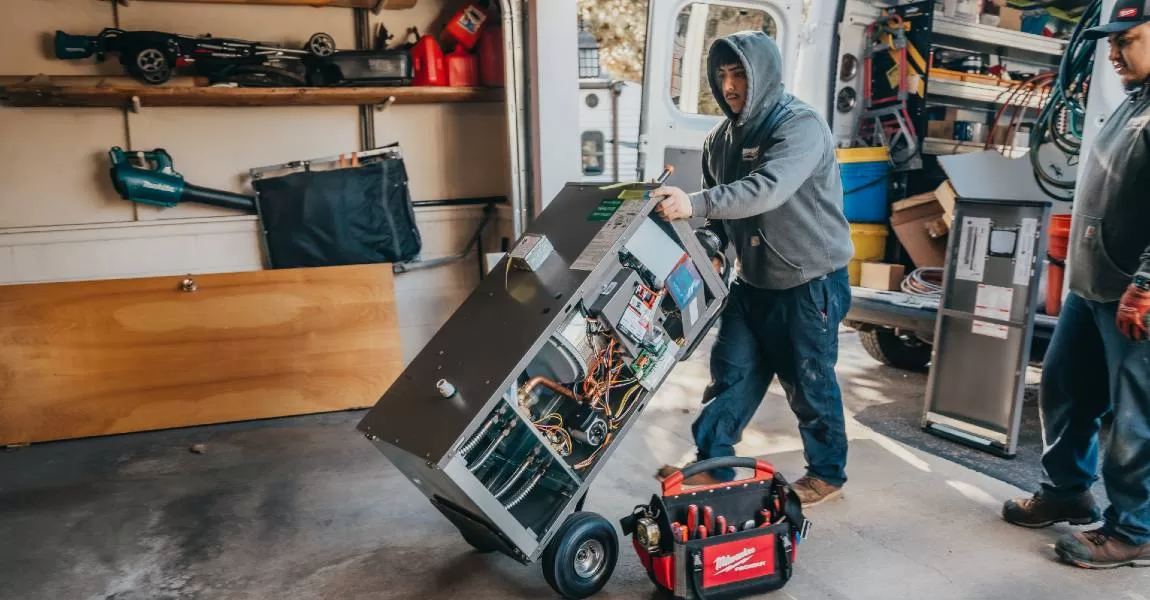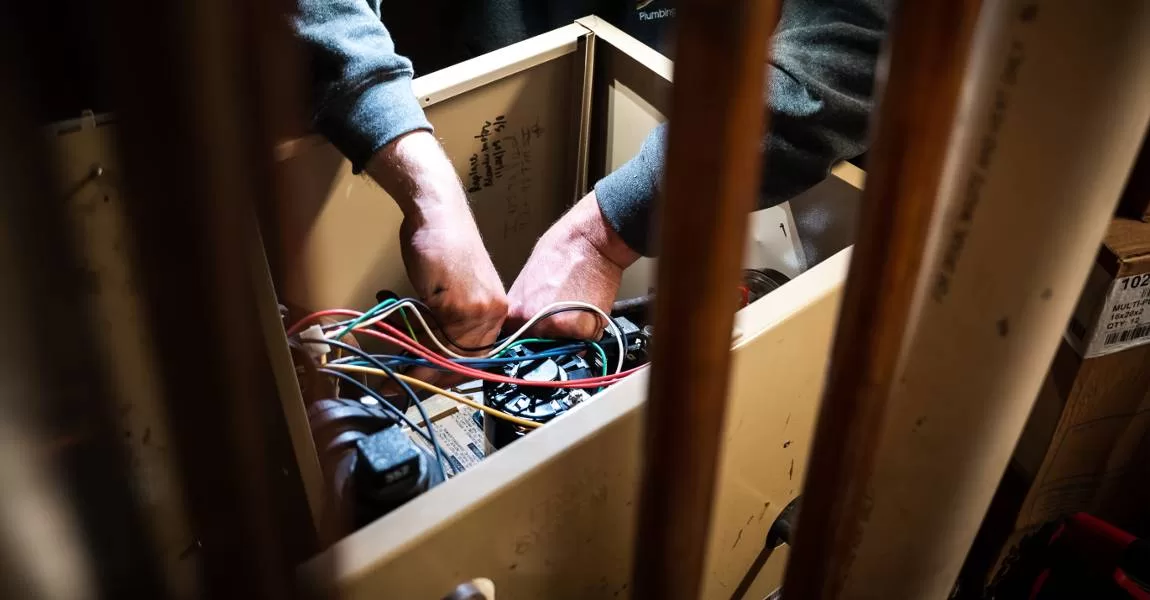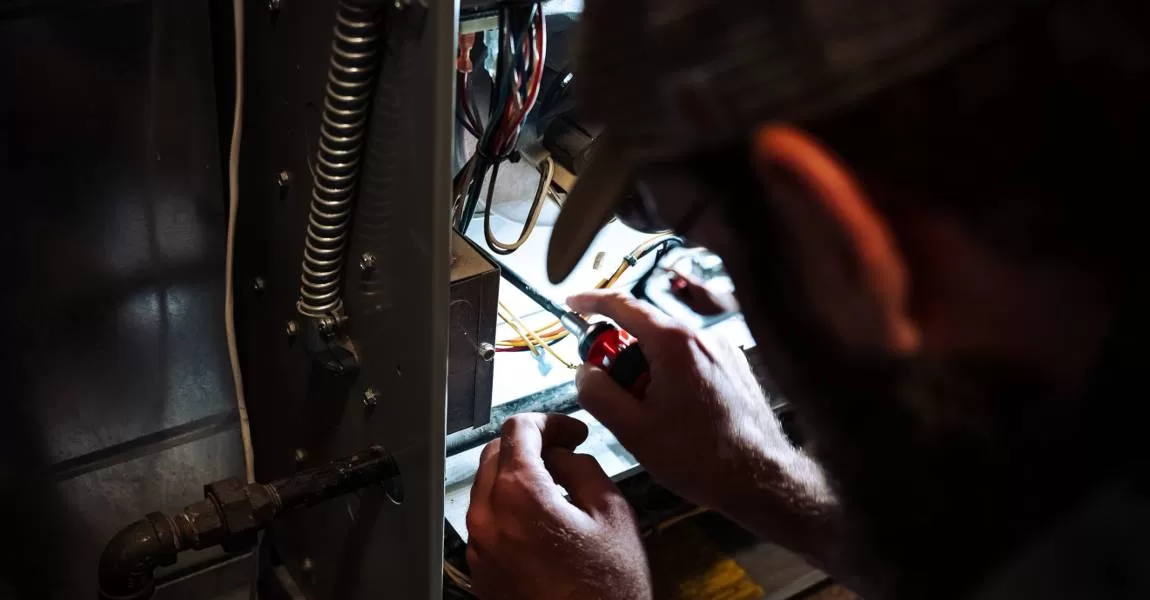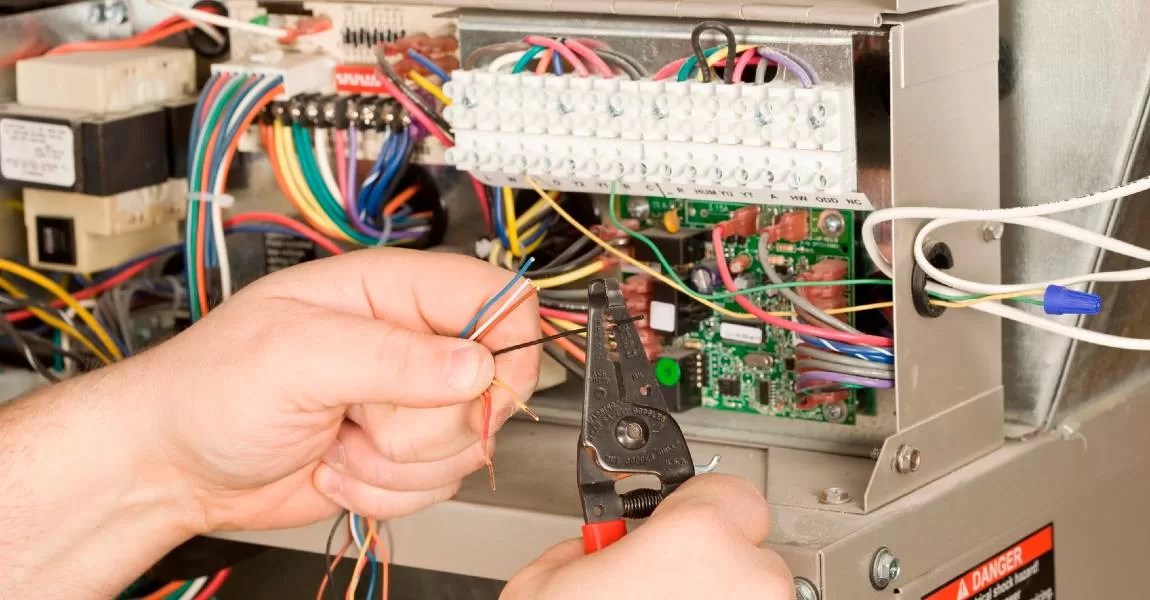Selecting the right furnace for your home is essential for comfort, efficiency, and safety. In this guide, we’ll compare Electric Furnace vs Gas Furnace to help you make an informed choice that best suits your home’s heating needs. Keep reading to learn more about Choosing the Best Heating System Electric Furnace vs. Gas Furnace.

Table of Contents- Electric Furnace vs Gas Furnace
How Electric Furnace vs. Gas Furnace Work
Electric Furnaces
Electric furnaces generate heat by passing an electric current through heating elements. This method offers efficient heat production and is straightforward to install in homes with existing electrical connections.
Gas Furnaces
Gas furnaces use natural gas or propane as fuel. The system ignites gas within a burner to produce heat, which is then distributed through ducts. These systems can heat spaces quickly and are generally more efficient in colder climates.
Comparing Installation Costs Electric Furnace vs. Gas Furnace

Electric Furnaces
Electric furnaces are often more affordable to install. They require only an electrical connection, making installation less complex and eliminating the need for gas lines or venting.
- Average Cost Range: $1,100 – $2,800 for a standard 60,000-BTU electric furnace.
- Labor and Installation: Generally lower due to simpler setup and no venting requirements.
Gas Furnaces
Gas furnaces tend to have higher installation costs due to the need for gas lines and proper ventilation. If your home currently lacks a gas connection, installation costs will be even higher.
- Average Cost Range: $1,300 – $3,000 for standard units; high-end models can reach up to $12,000.
- Labor and Installation: More complex, often requiring permits and certified professionals.
Energy Efficiency Considerations
Gas furnaces are generally more energy-efficient for heating in colder climates because gas produces warmer air more quickly than electricity. However, electric furnaces boast a higher energy utilization efficiency (up to 100% AFUE) because nearly all electricity is converted to heat.
- AFUE Ratings: Modern high-efficiency gas furnaces can achieve AFUE ratings of 90% or more, though older units may rate as low as 57%.
- Electric Furnaces: Typically reach 95%-100% efficiency.
Energy Costs by Fuel Type
Electricity rates vary widely but are typically higher per BTU than natural gas. For households in colder areas, the lower cost of natural gas can make gas furnaces more economical over time.
Climate Suitability for Gas and Electric Furnaces
Cold Climates
Gas furnaces are more efficient in colder climates, as they deliver warmer air and heat spaces quickly. Natural gas is generally more affordable than electricity in these regions, making it a cost-effective choice for colder weather.
Mild to Moderate Climates
Electric furnaces are suitable for mild climates or as secondary heating sources. Their energy efficiency and lower initial costs make them ideal for locations with shorter heating seasons.
Maintenance and Repair Costs
Gas furnaces require regular maintenance, including annual inspections for gas leaks and ventilation issues, to ensure safety and efficiency. Electric furnaces, with fewer moving parts, generally have lower maintenance needs and costs.

Gas Furnace Maintenance
- Annual Tune-Ups: Necessary for safe operation and typically cost $125 – $200.
- Common Repairs: Heat exchangers and gas lines can require expensive repairs if damaged.
Electric Furnace Maintenance
- Less Frequent Maintenance: Only periodic checks are needed.
- Common Repairs: Circuit boards and heating elements, generally less costly than gas furnace repairs.
Safety Factors
Gas Furnaces
Gas furnaces carry risks of carbon monoxide exposure if not properly vented. Carbon monoxide detectors are essential for any home with gas appliances, and professional inspection is recommended to prevent safety issues.
Electric Furnaces
Electric furnaces are generally safer than gas models as they don’t produce combustion gases. However, like any large electrical appliance, they should be properly installed and inspected periodically.
Environmental Impact
Electric furnaces produce zero combustion emissions, making them a cleaner choice, particularly in areas where renewable energy is available. Gas furnaces are more energy-efficient in colder climates but contribute to greenhouse gas emissions.
Making the Right Choice
Choosing between an electric furnace vs. gas furnace depends on factors like climate, budget, and energy availability. Gas furnaces are ideal for colder climates with access to affordable natural gas, while electric furnaces are suitable for milder climates or homes without gas connections.
- Cold Climate, Lower Energy Cost Preference: Opt for a gas furnace.
- Moderate Climate, Lower Initial Cost Preference: Choose an electric furnace.
In summary, understanding your specific heating needs, budget, and climate will help you make the best choice for your home. A professional HVAC contractor can provide valuable insights tailored to your property, ensuring optimal comfort and efficiency.
Evaluating Longevity and Lifespan of Electric vs. Gas Furnaces
When making a decision about heating systems, lifespan is an essential consideration. Both electric and gas furnaces have unique longevity factors based on usage, maintenance, and environmental conditions.
Electric Furnace Longevity
Electric furnaces are known for their durability, often lasting 20 to 30 years due to fewer moving parts and less wear from heat variations. With regular maintenance, they can achieve a longer lifespan without the risk of combustion-related degradation.
- Expected Lifespan: 20-30 years with minimal maintenance.
- Common Replacement Components: Circuit boards and heating elements.
Gas Furnace Longevity
Gas furnaces typically last between 15 and 20 years. Their lifespan is shorter due to the combustion process, which can cause wear on heat exchangers and other components over time. Regular tune-ups can help extend their lifespan and improve safety.
- Expected Lifespan: 15-20 years with annual tune-ups.
- Common Replacement Components: Heat exchanger and burners.

Analyzing Fuel Availability and Regional Considerations
Fuel availability varies by region and affects furnace choice significantly. While natural gas is accessible and economical in many areas, some regions may lack the infrastructure, making electric heating a more practical choice.
Areas with Readily Available Natural Gas
For regions with a stable, affordable natural gas supply, gas furnaces offer a practical and cost-effective solution, especially in cold climates where heating needs are extensive.
Remote or Off-Grid Locations
Electric furnaces may be the ideal choice for remote areas where natural gas is unavailable or costly to install. They can often run on grid electricity or be powered by renewable sources, making them flexible for different locations.
Comparing Operating Noise Levels
Noise can influence comfort, especially in homes where the furnace is located near living areas. The operational sounds of electric and gas furnaces differ:
Electric Furnace Noise
Electric furnaces are quieter, with fewer operational sounds since they lack a combustion process. This makes them ideal for quieter spaces or homes where noise is a concern.
Gas Furnace Noise
Gas furnaces produce more noise due to the ignition and combustion process. Modern gas furnaces are equipped with sound-dampening technology, though they may still emit some noise during operation.
Pros and Cons Summary for Electric and Gas Furnaces
Electric Furnace Pros and Cons
| Pros | Cons |
|---|---|
| High efficiency (95%-100%) | Higher monthly operating costs |
| Low installation cost | Less effective in extreme cold |
| Low maintenance needs | Relies on electricity |
| Safer with no combustion | Potential for power outages |
Gas Furnace Pros and Cons
| Pros | Cons |
|---|---|
| Lower fuel cost in cold climates | Higher installation cost |
| Quick, efficient heating | Requires annual maintenance |
| Effective in extreme cold | Potential carbon monoxide risk |
| Long-term savings in fuel costs | Requires proper ventilation |
Key Questions to Ask When Choosing Between Electric and Gas Furnaces
To make an informed decision, consider these essential questions:
- What are my heating needs based on climate? Cold climates may benefit more from gas heating.
- What are the installation requirements for each system? Determine if your home is suited for gas line installation or if electric wiring upgrades are needed.
- What is the initial budget, and how much am I willing to spend long-term? Electric furnaces are cheaper to install, but gas is often more affordable to operate over time.
- Are there specific safety or environmental considerations? Gas furnaces carry safety risks without proper maintenance, while electric furnaces are environmentally friendly in areas using renewable electricity.
- How accessible are energy sources in my area? Check the cost and availability of natural gas or electricity to guide your decision.
Conclusion: Finding the Best Furnace for Your Home’s Needs
In the electric vs. gas furnace debate, the best option depends on individual factors like climate, budget, fuel availability, and maintenance preferences. Here’s a quick overview:
- Cold Climates with Access to Natural Gas: A gas furnace can provide powerful and cost-effective heating.
- Moderate Climates or Areas Lacking Gas Lines: An electric furnace offers a reliable, lower-maintenance option.
Working with an HVAC professional to assess your home’s specific needs can provide invaluable guidance. With their expertise, you can select a system that balances efficiency, cost, and comfort, ensuring your home stays warm and safe through every season.
Need help deciding between an electric or gas furnace? JD’s Plumbing, Heating and Air Conditioning is here to guide you in choosing the perfect heating solution for your home. Our team can help you evaluate costs, efficiency, and the best option for your climate.
Contact us at 720-735-9170 to schedule a consultation or get expert advice on all your heating needs. Stay warm and comfortable with JD’s expert support!
FAQ – Electric Furnace vs. Gas Furnace
- What is the difference between an electric furnace and a gas furnace?
An electric furnace uses electricity to heat air, while a gas furnace burns natural gas to generate heat. Gas furnaces generally heat more quickly, while electric furnaces tend to be more energy-efficient and require less maintenance. - Which is more energy-efficient: electric or gas furnace?
Electric furnaces are often more energy-efficient as they convert almost all the electricity they use into heat. However, due to the higher cost of electricity compared to natural gas, electric furnaces can be more expensive to run. - Which has lower operating costs, electric or gas furnaces?
Generally, gas furnaces have lower operating costs because natural gas tends to be cheaper than electricity. However, this can vary based on local energy prices and the efficiency of the furnace. - Are electric furnaces safer than gas furnaces?
Yes, electric furnaces are generally safer since they do not burn fuel and do not produce carbon monoxide. Gas furnaces need proper ventilation to prevent gas leaks and carbon monoxide buildup. - Which furnace heats a home faster: electric or gas?
Gas furnaces typically heat up faster because natural gas generates more immediate and intense heat. Electric furnaces may take longer to reach the desired temperature. - What is the average lifespan of an electric furnace compared to a gas furnace?
Electric furnaces tend to last longer, with an average lifespan of 20-30 years, while gas furnaces usually last around 15-20 years due to the wear and tear from burning fuel. - Which furnace type requires more maintenance: electric or gas?
Gas furnaces typically require more maintenance, including annual inspections for gas leaks, burner cleaning, and vent checks. Electric furnaces generally need less upkeep. - Are electric furnaces more environmentally friendly than gas furnaces?
Electric furnaces can be more eco-friendly, especially if powered by renewable energy sources. Gas furnaces emit carbon dioxide, making them less environmentally friendly due to greenhouse gas emissions. - Can I switch from a gas furnace to an electric furnace or vice versa?
Yes, you can switch between types, but it often involves significant modifications, like adding gas lines or upgrading electrical capacity, which can increase installation costs. - Which is better for colder climates: electric or gas furnaces?
Gas furnaces are generally more effective in colder climates because they provide faster and more intense heat. Electric furnaces may struggle to maintain warmth in very low temperatures, making them less ideal for extremely cold regions.


